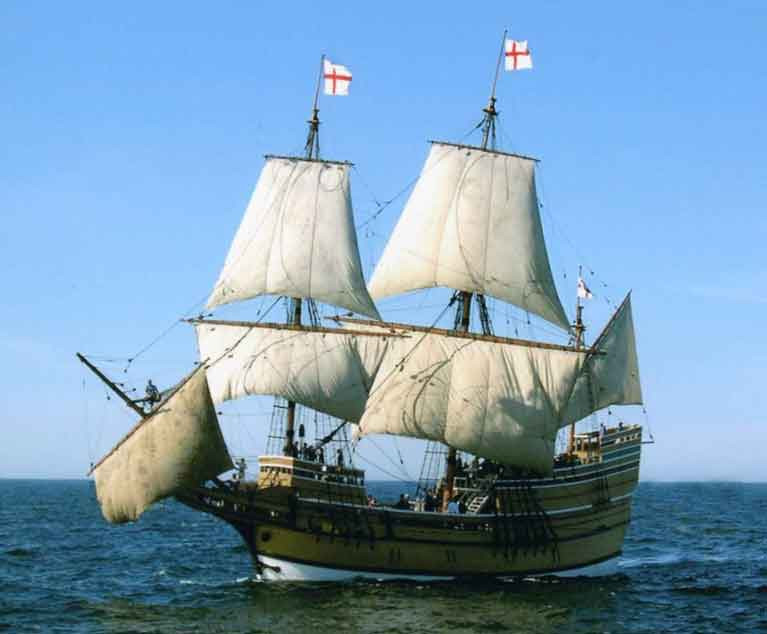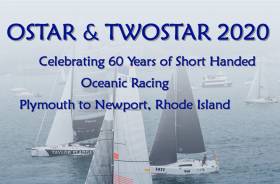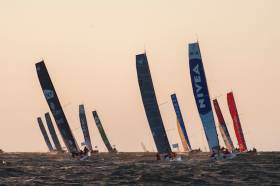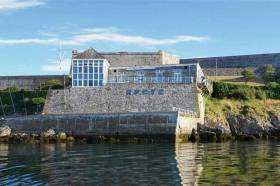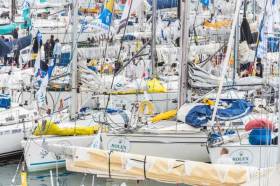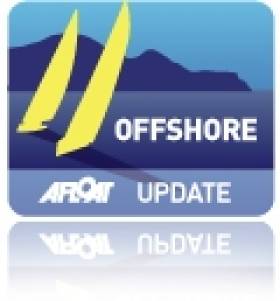Displaying items by tag: Plymouth
If Your Port’s Name is Attached to a Sailing Event, Make Sure to Keep That Link Alive…
Some sailing events capture the popular imagination, while others – for some reason – simply pass by relatively unheeded. Either way, there’s no doubting that the 628-mile Rolex Sydney-Hobart Race is in the former category, with its crazy Christmas-time start witnessed by as many as 600,000 people, watching the inevitable flotilla of over-the-top SuperMaxis weaving their way out of the superb harbour at the head of an exceptionally varied and historic fleet.
It was going to be special in this year of all years, for 75 years is a long time in terms of Euro-centric Australian history. Of course, there were people in Australia for tens of thousands of years before the Europeans arrived. But like the early pre-Spanish discoverers of the Canary Islands, those First Australians who did manage to get safely ashore – for many didn’t make it – gradually abandoned any thought of seafaring as they worked out ways of making a living entirely on land from this very strange place they’d stumbled upon.
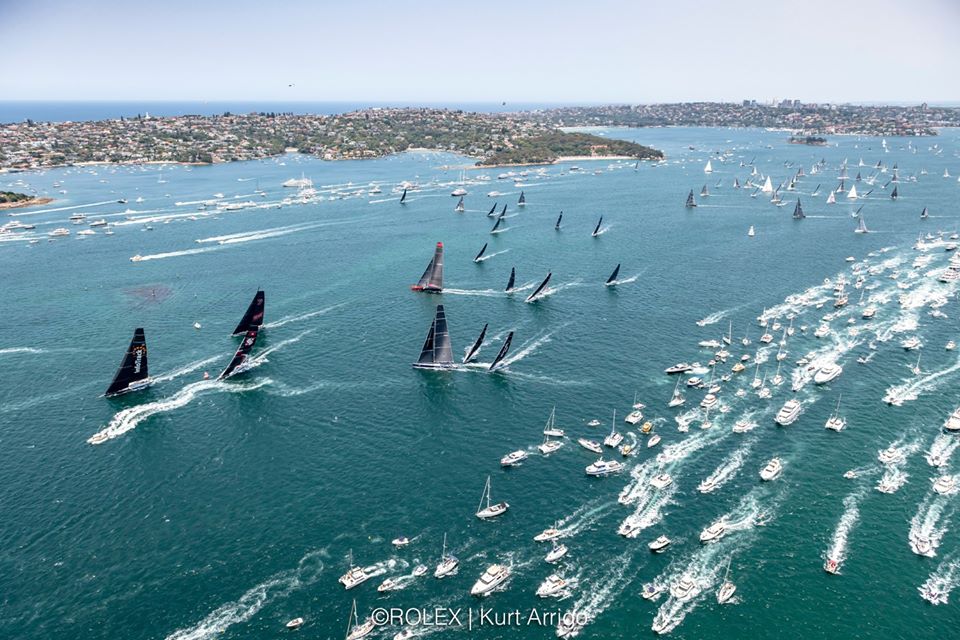 The big boats get away from the Sydney haze at the start on Thursday. Photo: Rolex/Kurt Arrigo
The big boats get away from the Sydney haze at the start on Thursday. Photo: Rolex/Kurt Arrigo
But for the new Australians from Europe, seafaring with its communication to the outside world was essential. Yet their distance from that world meant they developed their own ways of doing things, with the betting-mad Sydney Harbour 18-footers the ultimate sailing expression of the sports-oriented Australian way of life.
This year, the Sydney-Hobart has taken on added significance, for since August, Australia has been fighting a growing – and sometimes tragically fatal - battle with bush fires. The Lucky Country has been out of some of its luck, and it’s arguable that this loss of luck has been partly self-inflicted. But no country in the world can claim innocence in the causes of climate change, yet it’s Australia’s misfortune that the bush fires after years of drought should so markedly impinge on the Australian way of life, with its outdoor emphasis.
The Sydney-Hobart Race is a chance to show that life goes on, albeit in a wiser frame of mind. All it needed on December 26th 2019 was a decent onshore breeze to restore Sydney Harbour to its clear and sunny self, and a fleet which acknowledged that times aren’t quite normal, but life must go on.
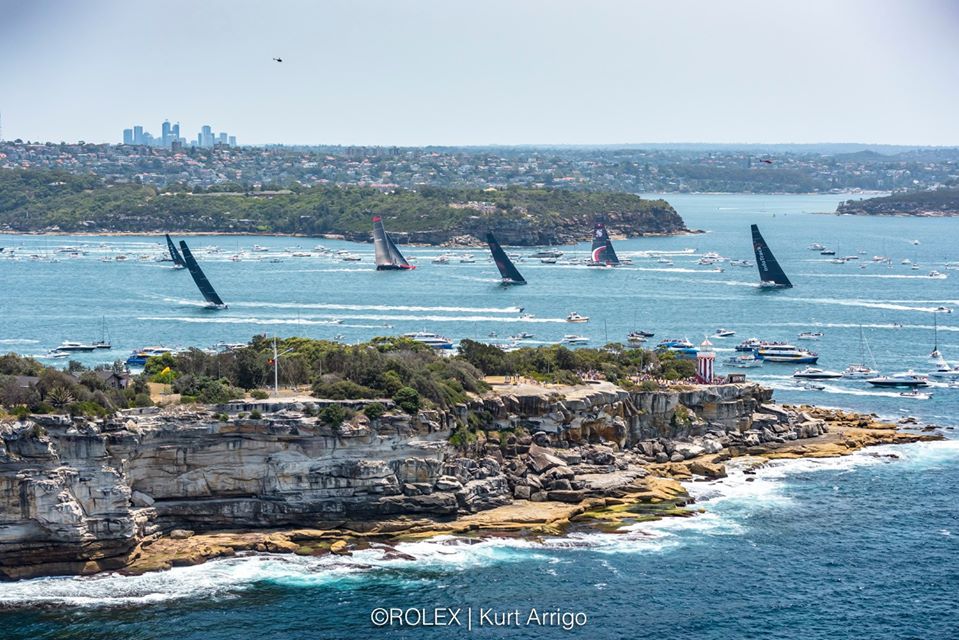 The SuperMaxis heading into open water on Thursday – the size of the spectator fleet, plus tens of thousands of watchers ashore, spoke volumes for how much the successful staging of the 75th Rolex Sydney-Hobart Race meant to Australians in these challenging times. Photo: Rolex/Kurt Arrigo
The SuperMaxis heading into open water on Thursday – the size of the spectator fleet, plus tens of thousands of watchers ashore, spoke volumes for how much the successful staging of the 75th Rolex Sydney-Hobart Race meant to Australians in these challenging times. Photo: Rolex/Kurt Arrigo
And it certainly is a life-affirming event, one of sailing’s great spectacles, yet one in which every boat in the fleet from 30 footers to 100 footers feels equally involved. Having been inaugurated in 1945 under the inspiration of that remarkable offshore racing pioneer John Illingworth, it soon seemed the most natural thing in the world to race from Sydney to Hobart, for an annual cruise-in-company along the same route was a Christmas tradition at the Cruising Yacht Club of Australia.
Today, Sydney-Hobart as a brand name has real muscle, and while Sydney has always basked in its association with the race’s start, it took the more conservative Hobart rather longer to realize that this sporting special gave them a USP in the Tasmania-promotion stakes for tourism.
 Hobart in Tasmania – it’s the same latitude as Bordeaux in France
Hobart in Tasmania – it’s the same latitude as Bordeaux in France
In fact, interest is at an all-time high, for last year for the first time a Tasmanian boat was the overall winner, Philip Turner’s RP66 Alive. It’s as though a Wicklow boat had won the Round Ireland Race…… And these days, those who had thought Tasmania was a remote and windy island somewhere down towards the Antarctic are now aware that Hobart in the Southern Hemisphere is on the same latitude as Bordeaux in the Northern Hemisphere, and it’s a charming and scenically stunning place with its own remarkable classic yacht tradition.
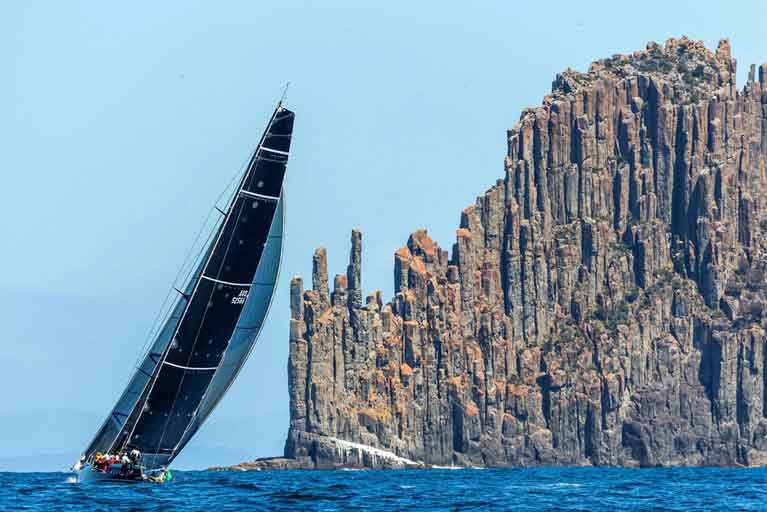 The Tasmanian RP 66 Alive weathering the famous Organ Pipes in the approaches to Hobart, on her way to the overall win in the 2018 Rolex Sydney-Hobart Race. Photo: Studio Borlenghi/Rolex
The Tasmanian RP 66 Alive weathering the famous Organ Pipes in the approaches to Hobart, on her way to the overall win in the 2018 Rolex Sydney-Hobart Race. Photo: Studio Borlenghi/Rolex
Thus the message is that if you’ve got your port associated with a great sailing event which has popular interest, for heaven’s sake do everything you can to nurture the relationship. In following the Sydney-Hobart Race’s fascinating progress with its often extraordinary yet time-honoured finish totally identified with Hobart, it’s a reminder that just a month ago, the world of offshore racing – indeed the world of sailing globally – was agog at the news that the biennial Fastnet Races of 2021 and 2023 would not finish at Plymouth in Devon - as the race had done since its inauguration in 1925 - but instead would finish in Cherbourg, where the local authorities were prepared to be lavish with their preparations and welcome.
The people of Plymouth must think the fates have got it in for them. The historic harbour, associated with the swashbuckling if sometimes very questionable wealth-enhancing seafaring deeds of the likes of Drake and Raleigh and Hawkins, has been seeing its more modern maritime links greedily challenged by other ports.
As Shakespeare observed in another context in the time of those energetic opportunists: “When sorrows come, they come not single spies, but in battalions”. For Plymouth, it was only starting when it was announced back in May that an alternative OSTAR (the original single-handed Transatlantic Race first staged from Plymouth’s Royal Western YC in 1960) was going to have a highly-funded re-birth from Brest in France.
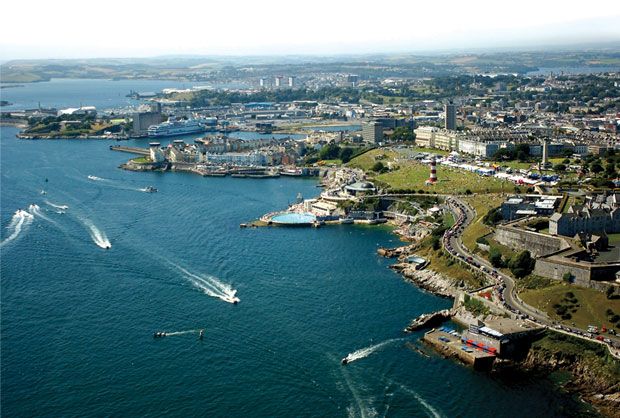 The Port of Plymouth, which has hosted the finish of every Fastnet Race since 1925. But for 2021, the finish will be in Cherbourg
The Port of Plymouth, which has hosted the finish of every Fastnet Race since 1925. But for 2021, the finish will be in Cherbourg
That announcement didn’t come from Plymouth. It emanated from OC Sport, who have rights in the race and are based in Cowes, but have been majority French-owned since 2014. Meanwhile, Plymouth is going ahead with its own 60th Anniversary OSTAR (Original Single-Handed Race) on 10th May.
For the mega-funded hyper-publicised French super-multihulls, the offering from Brest has obvious appeal. But the historical claims of Plymouth are likewise gaining their adherents, and as entries don’t close until 16th March 2020, the evolving story of the two races is continuing.
Then in late November, with just ten days to go until December’s Paris Boat Show with its potential to give significant upcoming events a fresh buzz of publicity, it was announced that the RORC Rolex Fastnet Races of 2021 and 2023 would not be finishing in Plymouth - as the race has done since it was founded in 1925 – but instead, in a course 90 miles longer, the finish would be in facility-filled money-waving Cherbourg in France.
The reactions to this have been spread right across the entire spectrum from complete disapproval to enthusiastic support, and even now it’s still simmering.
At the apparently rather sparsely attended but online-streamed press conference in RORC HQ in London, the top honchos did reveal that for the Centenary Fastnet Race in 2025, they might consider returning to Plymouth if berthing facilities has been markedly improved.
In the circumstances, it sounded slightly patronizing with an unpleasant whiff of the wheeler-dealing about it. But we can soften their cough by pointing out that if they really want a truly authentic Centenary Fastnet Race in 2025, then they’ll have to abandon the Cowes starting line, and instead start the fleet eastward out of the Solent from the Royal Victoria Yacht Club in Ryde. Back in 1925, the big clubs at Cowes declined to get involved in this crazy new venture. But once it was clear that it was established and would happen again, it was a case of Hello Cowes, Goodbye Ryde…….
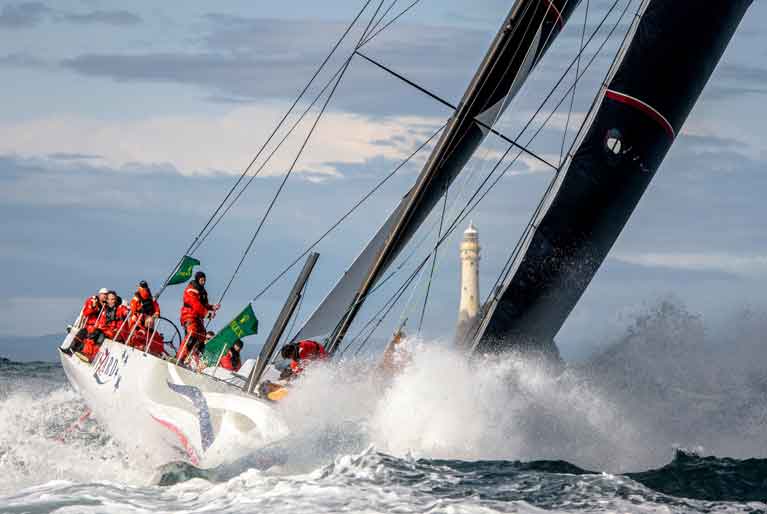 Wherever the Fastnet Race starts or finishes, it will still have to go round Ireland’s most famous rock. This is the American former Volvo 70 Wizard (David & Peter Askew), winner of World Sailing’s “Boat of the Year 2019” title, at the Fastnet Rock on her way to winning the Rolex Fastnet race 2019. Photo: Rolex
Wherever the Fastnet Race starts or finishes, it will still have to go round Ireland’s most famous rock. This is the American former Volvo 70 Wizard (David & Peter Askew), winner of World Sailing’s “Boat of the Year 2019” title, at the Fastnet Rock on her way to winning the Rolex Fastnet race 2019. Photo: Rolex
No matter what they do, Ireland’s impregnable Fastnet Rock remains immovably at the heart of it all. It is simply The Fastnet Race – full stop. But back in Plymouth, yet another historical challenge to their cherished maritime perception of themselves arose at the end of November. For they’d been thinking that, regardless of what might happen to the OSTAR and the Fastnet Race, the really big deal in their maritime history is their link to the Pilgrim Fathers sailing in the Mayflower from Plymouth to America in 1620.
Now there’s an anniversary to conjure with. 400 years to be celebrated in Plymouth in 2020 for something which has pure gold historical importance. But the people of Harwich on England’s East Coast say that Plymouth’s claims to the Mayflower story are only incidental. The ship began her voyage from the East Coast, they say, and only called briefly at Plymouth while heading west.
To underline their case, they’ve spent 2019 restoring the house in Harwich which was the home of Christopher Jones, Captain of the Mayflower, and in 2020 they look forward to greeting thousands of American visitors to Mayflower’s most tangible and authentic link.
And to the west of Plymouth, the people of the fishing port of Newlyn in Cornwall are also claiming that the Mayflower actually stopped there - albeit briefly – before the real beginning of the Transatlantic voyage, so that’s where the American tourists should be splashing their dollars.
Quite so. It would be time for the people of Plymouth to send for Francis Drake and his more ruthless shipmates to sort this out were it not for one indisputable geographic and historical fact. The place where the Pilgrim Fathers first landed in America in December 1620 is now known as Plymouh Rock. It is in Plymouth, Massachusetts. Harwich? Newlyn? Fuggedaboudit……..
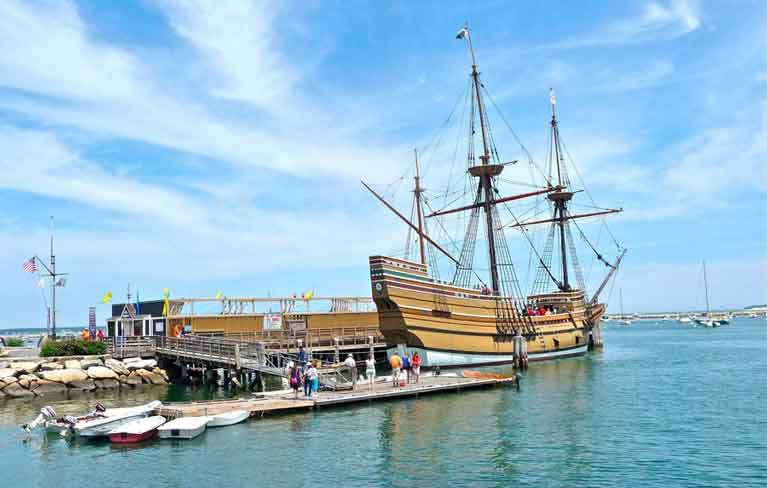 An inescapable fact of history and geography – Mayflower II berthed at Plymouth, Massachusetts.
An inescapable fact of history and geography – Mayflower II berthed at Plymouth, Massachusetts.
Meanwhile, Hobart and Tasmania have literally shaken off their links with a dismal penal colonial, past, and the place is re-born as a destination for the discerning, with a pleasant climate, fantastic scenery, and some great sailing people who can count winning the Sydney-Hobart race among their achievements. There’s no way they’re going to allow that particular link to be broken.
OSTAR & TWOSTAR To Remain In Plymouth, RWYC Confirms
Plymouth’s Royal Western Yacht Club has confirmed that it will run its OSTAR and TWOSTAR transatlantic races in 2020 from Britain’s Ocean City as it has done every four years since the first race in 1960.
“These races from Plymouth to Newport, Rhode Island will continue to be sailed as originally envisaged by Cockleshell hero Blondie Hasler, a test of skipper and boat against the North Atlantic Ocean,” said the club, which will next year celebrate 60 years since it introduced short-handed oceanic racing.
The OSTAR and TWOSTAR events will also be supported by Plymouth City Council as part of next year’s Mayflower 400 celebrations.
“Unfortunately the French organisers of The Transat 2020 have now decided to start their race in Brest rather than Plymouth,” the Plymouth club added. “This deprives the skippers and public of the opportunity to meet and share in the 60th anniversary of the OSTAR.”
The RWYC explained that The Transat was first sailed in 2004 when it decided it could no longer afford the cost or responsibility of running a ‘Grand Prix’ type event for the larger, one-design, highly sponsored and professionally skippered boats.
“The RWYC selected a commercial events organisation to run this part of the race while they continued to run the OSTAR, for professional and experienced skippers alike sailing any class of boat, as the corinthian event envisaged by the original participants 60 years ago.”
Plymouth No Longer Host Of Transat 2020 Start As Race Moves Across The Channel To Brest
The next edition of The Transat will now start in the French port city of Brest instead of Plymouth, race organisers have announced.
Plymouth on the Devon coast was originally confirmed over a year ago as the start venue for the 2020 edition of the four-yearly event, the first and oldest single-handed transatlantic race in history.
No explanation has been given for the switch away from Britain’s Ocean City, other than race owners and organisers OC Sport Pen Duick saying that the change comes as it looks “for innovative ways to secure the future of The Transat”.
“We are really pleased to be partnering with Brest for The Transat, and together we share a strong desire to continue developing the race in 2020 and beyond,” OC Sport CEO Hervé Favre said.
“We have seen from races such as the Route du Rhum-Destination Guadeloupe [also owned by OC Sport Pen Duick] just how engaged the French public are with offshore sailing where we had over two million visitors to the race village.
“Staging the start from Brest is a real opportunity for our sponsors and the teams to capitalise on this captive audience and we expect it to open up many new commercial opportunities which are essential to guarantee the longevity of the race. I’d like to thank Plymouth for their support of the race up until this point.”
The Transat will celebrate its 60th anniversary when the world’s top solo sailors gather to race 3,500 nautical miles across the North Atlantic this time next year.
While the race was born in the UK, its organisers say it has always attracted the French elite of offshore sailing, who in recent years have dominated the race.
Last year Plymouth was also the focus of rumours that it might lose out as the traditional start of the Rolex Fastnet Race to a French port, though that speculation was swiftly shot down by the RORC which said it was working to make the Plymouth start even “bigger and better”.
Royal Plymouth Corinthian Yacht Club Has Been Put Up for Sale
Plymouth's historic Royal Plymouth Corinthian Yacht Club is set to go up for sale. Built in 1688 as part of the Royal Citadel, the imposing property that has its own access to the water, has been used as a clubhouse since 1896 and it is the first time in living memory it has ever gone on the market reports Devon Live.
It is looking for bids above the guide price of £750,000.
Michael Easton, Director at JLL in Exeter, which is handling the sale, said: "The sale will attract considerable interest due to its truly outstanding position on the waterside. This is to secure the long-term future of the club and members will be looking for alternative premises, or to continue in some capacity in the existing building if the marketing programme allows for this."
The Royal Plymouth Corinthian Yacht Club has a long history of organising Dinghy and Yacht racing in and around Plymouth.
The yacht club is thought to be one of the last remaining privately owned freehold sites on the water's edge in Plymouth Sound. It has direct access to the water from its own dinghy park and has outstanding 180-degree views across the sea from Mount Batten to Mount Edgcumbe in Cornwall.
More from www.devonlive.com here
Organisers Confirm Plymouth To Host 2019 Rolex Fastnet Race
Plymouth City Council and the Royal Ocean Racing Club (RORC) have confirmed that Plymouth will host the finish of the 2019 Rolex Fastnet Race.
Plymouth has marked the end of the renowned biennial offshore yacht race since its inception in 1925, and was the subject of speculation earlier this year that it could lose out on its traditional race-hosting duties to a coastal port in France.
As regular readers will recall, Afloat.ie was one of the earliest sources of the possible Fastnet Race change of format here
Starting in Cowes on the Isle of Wight, competitors in the Fastnet Race cover a course of 608 nautical miles and round the Fastnet Rock off the southwest coast of Ireland before returning via the Isles of Scilly to finish in Plymouth.
The race has a huge worldwide following and has seen continued growth over recent years, with the limit of 300 boats having to be increased to over 340 due to high demand.
Deputy leader of the council, Pete Smith said: “I’m delighted that the Rolex Fastnet is returning to its historic home once again in 2019.
“We are working closely with the organisers of the Rolex Fastnet Race, the Royal Ocean Racing Club, to enhance the experience of the thousands of sailors who arrive in Plymouth after competing in the race.”
Yachts come from all over the world to compete in the race which will start in Cowes on Saturday 3 August. The first yachts are expected to arrive in Plymouth in the early hours of Monday 5 August.
The Plymouth race village will be located at Yacht Haven at Mount Batten and will be open to the public from Tuesday 6 to Thursday 8 August, with live music, family-friendly activities and opportunities for local people to try their hand at on-water activities like sailing, kayaking and stand-up paddle boarding.
Cllr Smith continued: “The race is hugely significant for the city, helping to put Plymouth on the map and attracting visitors to see the finish of one of the world's most famous yacht races.
“We want to make sailing more accessible for people living here and encourage more participation in the sport. Hosting internationally renowned events like this is important to help motivate and inspire participation.”
RORC racing manager Chris Stone said: “Plymouth’s waterfront position is one of the most dramatic and beautiful in the UK and the city has amazing facilities for yachts and sailors. We are pleased to be working closely with Plymouth City Council to make the race bigger and better and provide a warm welcome for the 350-plus boats descending on the city.
“It is also a great opportunity for local people to come and experience our sport and understand how much fun it is and easily available to all.”
The Rolex Fastnet will be followed by the Britain’s Ocean City Blues n Jazz Festival from Friday 9 to Sunday 11 August, rounding off a week of celebration.
Fastnet Race Organisers Respond To Rumours That Finish Could Move To France
#FastnetRace - Organisers of the Rolex Fastnet Race have moved to shoot down rumours that the offshore classic was planning a move from its “ancestral home” in Plymouth to France, as the Plymouth Herald reports.
Earlier this month the Royal Ocean Racing Club (RORC) announced a shakeup for next year’s Fastnet with the news that it would start two weeks earlier than originally scheduled, in order to avoid poor weather implications and clashes with the UK bank holiday.
But race organisers have said these changes won’t involve a move away from its traditional Plymouth finish in 2019, despite the idea being mooted some years ago.
Spokesperson Trish Jenkins said RORC executives “are working with [Plymouth’s] city council on the 2019 race to make it bigger and better”.
The Plymouth Herald has more on the story HERE.
This article was updated on Friday 28 September to clarify statements from the RORC in the Plymouth Herald's report
Missing Solo Sailor Airlifted To Cork Hospital
#Offshore - BBC News reports that a sailor who went missing last week during a solo voyage from Plymouth to Portugal has been located and airlifted to hospital after falling overboard.
The 66-year-old man set off last Monday 10 June but apparently suffered chest injuries during the first night.
Falmouth Coastguard has difficulty contacting the man to determine his position but he was eventually found some 225km off the Isles of Scilly. He was later transported by helicopter to Cork for treatment.
Plymouth Gets New Maritime Training Centre
#training – SeaRegs Training has opened a Maritime Training Centre based in Plymouth, Devon.
SeaRegs Training specialises in courses for people who want to work in the marine industry, offering internationally recognised MCA and STCW95 courses including STCW First Aid, STCW Personal Survival Techniques, STCW Personal Safety and Social Responsibilities, plus preparation courses for MCA Master 200/Officer of the Watch 500 and Boatmaster licences.
"We have a background in providing sound advice and solid training to people looking at coming into the industry or increasing their knowledge and certification. We hope to extend our range of courses over the coming year to ensure we fully reflect what skills the marine industry and the mariner require'. Simon Jinks, Managing Director of SeaRegs said.
"SeaRegs also offer online training for navigation and safety modules allowing seafarers to learn at their own pace or onboard ship. This is becoming an increasing popular way to learn with the increasing demands on people's time. Whilst the learning is online, help is only a phone call or email away" Jinks added.
SeaRegs also offer a host of professional RYA/MCA powerboat, motorboat and sailing training for people who work afloat so that they gain commercial endorsements and instructor courses for those who would like to teach in the industry.
SeaRegs M.D., Simon Jinks has over 25 years experience in the field of marine training, having previously run the RYA's Yachtmaster Training Scheme and also recently authored the RYA Commercial Regulations - Small Vessels book and ISAF Guide To Offshore Personal Safety For Racing And Cruising.
Courses run throughout the year in Plymouth and often in other areas and countries. For more information visit: www.searegs.co.uk or call 01392 580771
RNLI To Play Big Part in Olympic Torch Relay
#OLYMPICS 2012 - The RNLI will play a "key role" during the Olympic torch relay ahead of the London games this summer, as Yachting and Boating World reports.
On 28 May the Olympic torch is set to visit Anglesey in north Wales, when it is taken along the Menai Strait on board the RNLI's Annette Mary Liddington.
The torch will again be carried by RNLI volunteers on 18 July when it is ferried to shore from a tall ship in Dover harbour aboard the all-weather lifeboat City of London II.
Dover RNLI's operations manager Roy Couzens said: “We are very much looking forward to being involved on the day – and believe me, when that torch is at sea in our lifeboat, it couldn’t be in safer hands!”
The Olympic torch relay begins in Plymouth on 19 May and finishes at the Olympic Stadium on 27 July. Its two-month-long journey will take it throughout Britain and Northern Ireland, and includes a visit to Dublin on Wednesday 6 June.
An interactive map of the complete torch relay route is available on the official London 2012 website HERE.
America's Cup Racing Underway in Plymouth (Pics Here)
Top sailing teams are training towards the 2013 America's Cup in Plymouth on the English South Coast this weekend. The new format, with an initial series in 45ft catamarans building up towards a final in 72ft cats, was supposed to attract wide public attention. But, as WM Nixon noted in yesterday's Irish Independent, during their first outing in European waters in Portugal last month, it emerged that even in New Zealand, the hotbed of AC talent, the high point of sailing interest during August was in the Rolex Fastnet Race.
The series needs time to gain public attention of course and all the AC squads are now in Plymouth, where their next contest is getting under way. Southwest England has been experiencing the same fierce weather as Ireland, only more so. Rick Tomlinson has sent photographs (BELOW) from the first day of the America's Cup World Series.


























